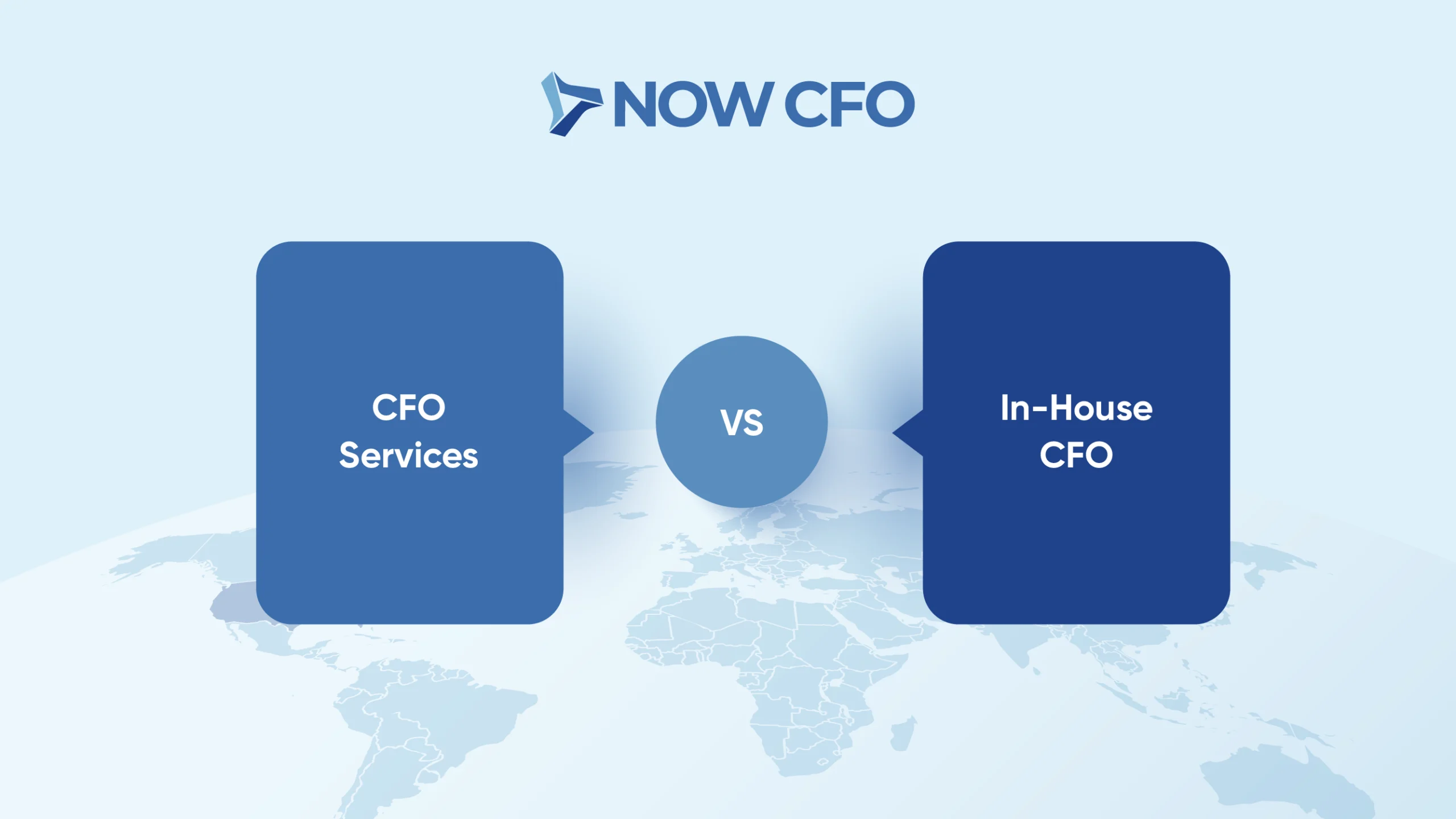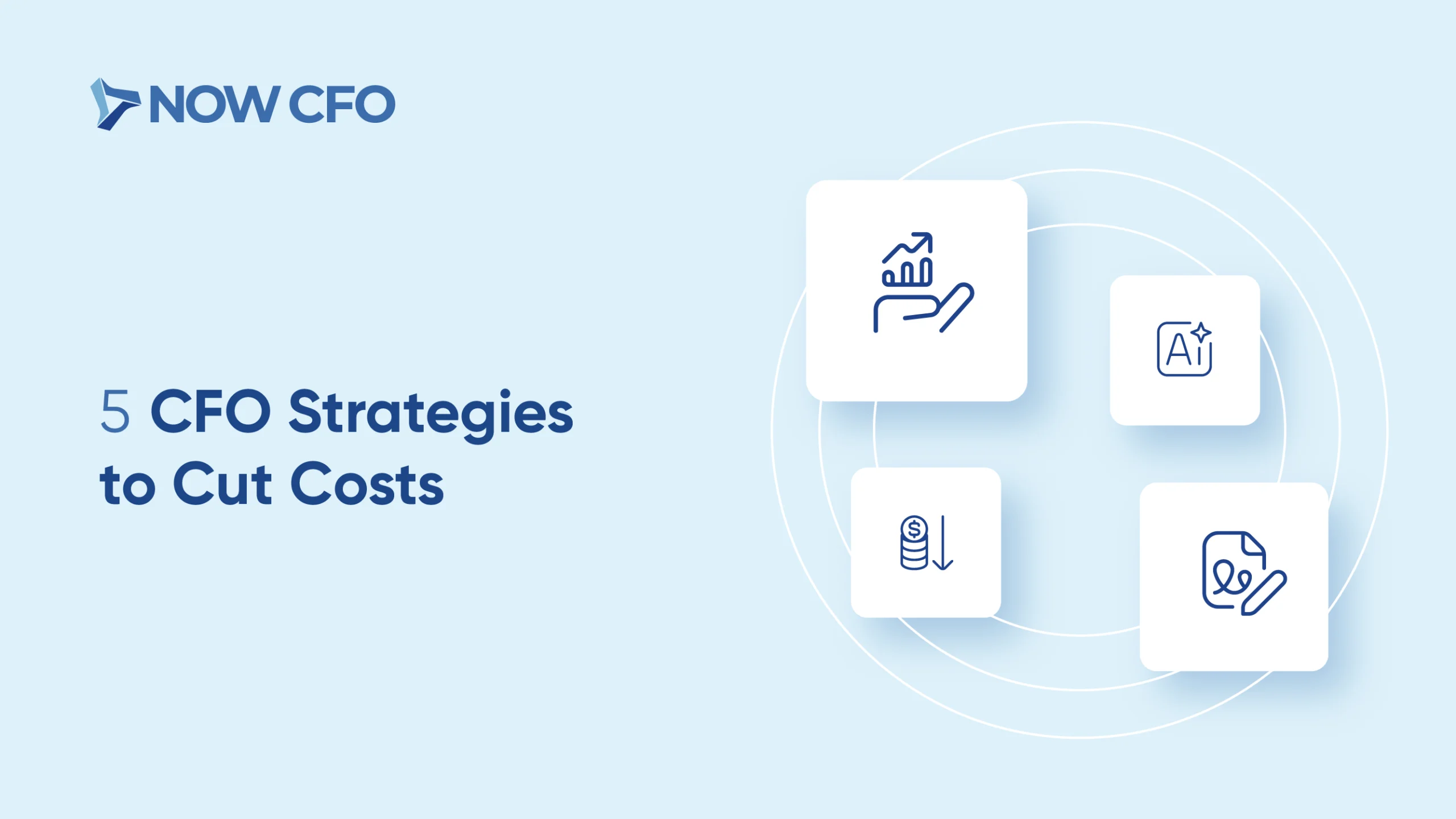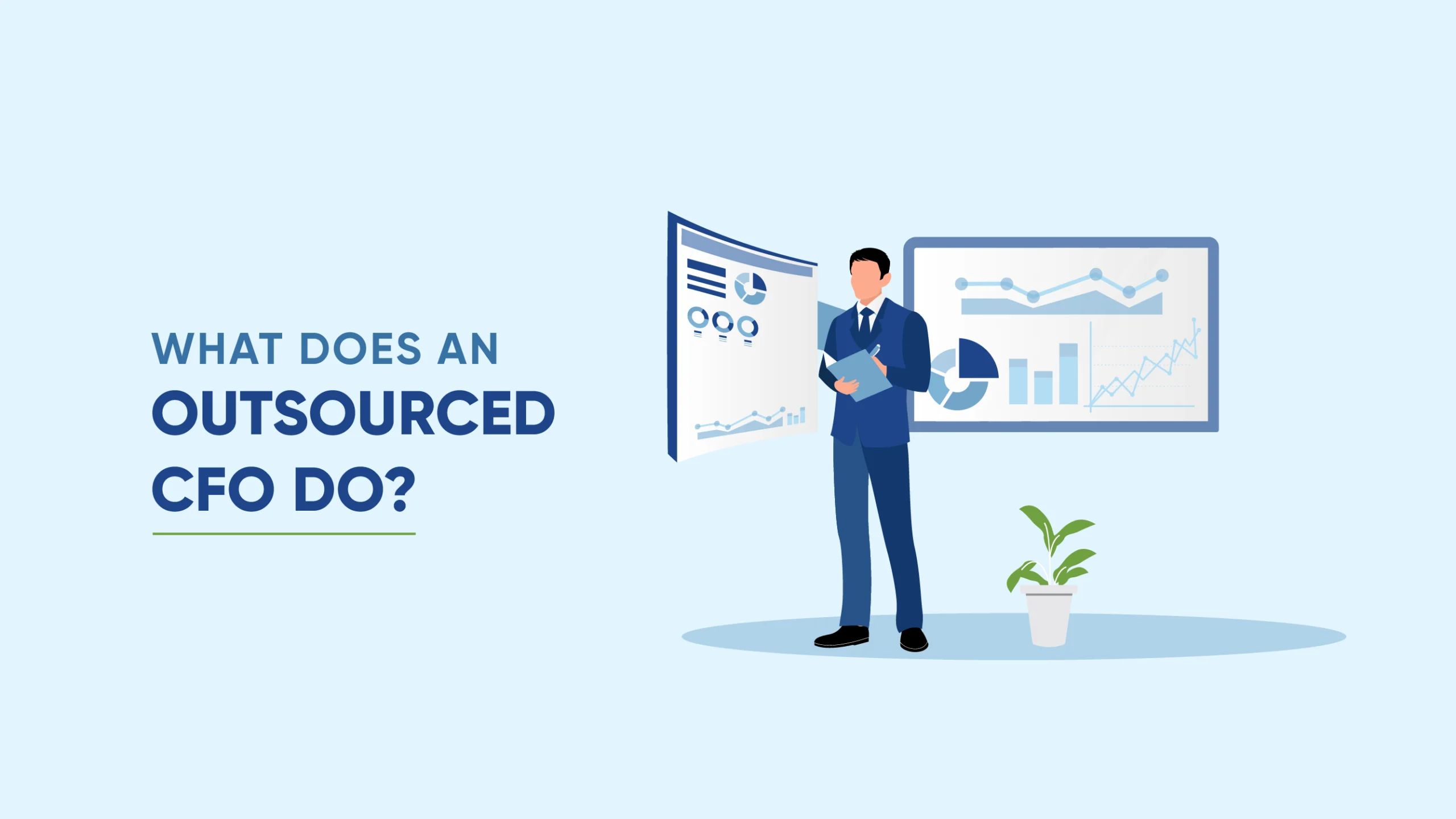
Financial management is a notable challenge for many businesses. An outsourced CFO can provide the strategic financial leadership necessary to overcome these hurdles. Inefficiencies can cost companies up to 30% of their revenue annually, underscoring the importance of expert financial guidance.
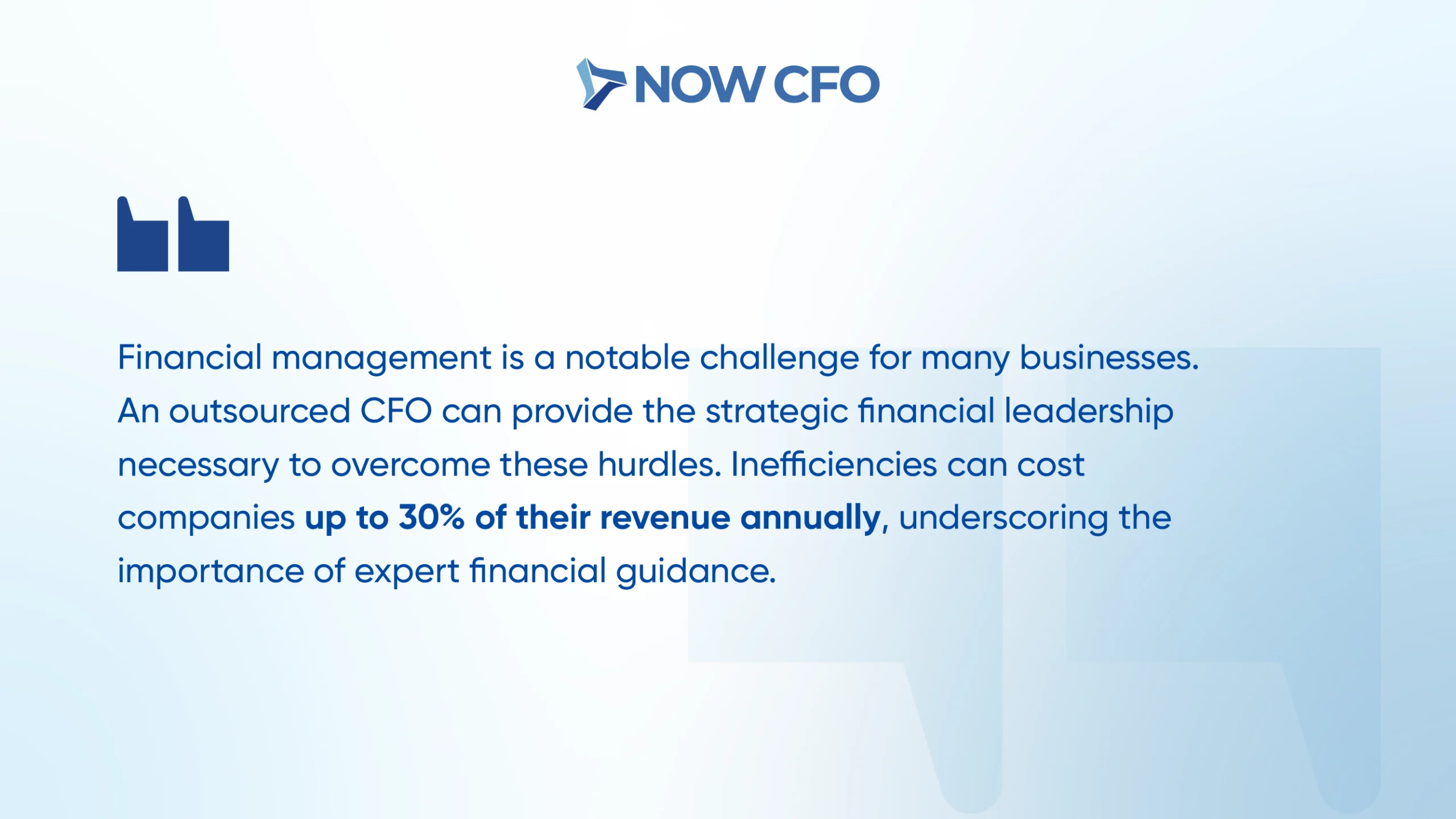
An outsourced CFO offers a cost-effective solution, delivering high-level financial expertise without the overhead of a full-time executive. They assist in cash flow management, financial forecasting, and strategic planning, enabling businesses to make informed decisions and foster sustainable growth.
Understanding the Role of an Outsourced CFO
Understanding the role of an outsourced CFO is pivotal for businesses aiming to enhance their financial strategy without the overhead of a full-time executive.
What Defines an Outsourced CFO?
An outsourced CFO is a seasoned financial expert who provides high-level strategic, operational, and financial leadership to businesses on a part-time, temporary, or contract basis. Unlike a full-time CFO, an outsourced CFO offers flexible engagement tailored to a company’s specific needs without the commitment of a full-time hire.
They bring a wealth of experience from various industries, allowing them to offer diverse perspectives and solutions. Their responsibilities often encompass forecasting and budgeting, financial systems integration, audit readiness, and cash flow strategy.
Moreover, outsourced CFOs play a crucial role in investor reporting, strategic decision-making, and profitability improvement. Their ability to provide insights into capital structure and assist in debt restructuring further underscores their strategic importance.
When Businesses Typically Hire Outsourced CFOs
Companies often turn to outsourced CFOs during pivotal moments in their growth trajectory. Startups, for instance, may require expert guidance to establish robust financial systems and strategies. Similarly, SMEs facing rapid expansion or preparing for investment rounds benefit from the strategic oversight these professionals provide.
Notable statistics highlight this trend: there has been a 103% increase in the hiring of interim CFOs in 2024 since 2023. Furthermore, businesses undergoing restructuring, M&A also engage outsourced CFOs to navigate the complexities of these processes.
Core Functions Versus Traditional CFO Roles
While both outsourced and traditional CFOs aim to steer a company’s financial strategy, their modes of operation differ. Here’s a comparative overview:
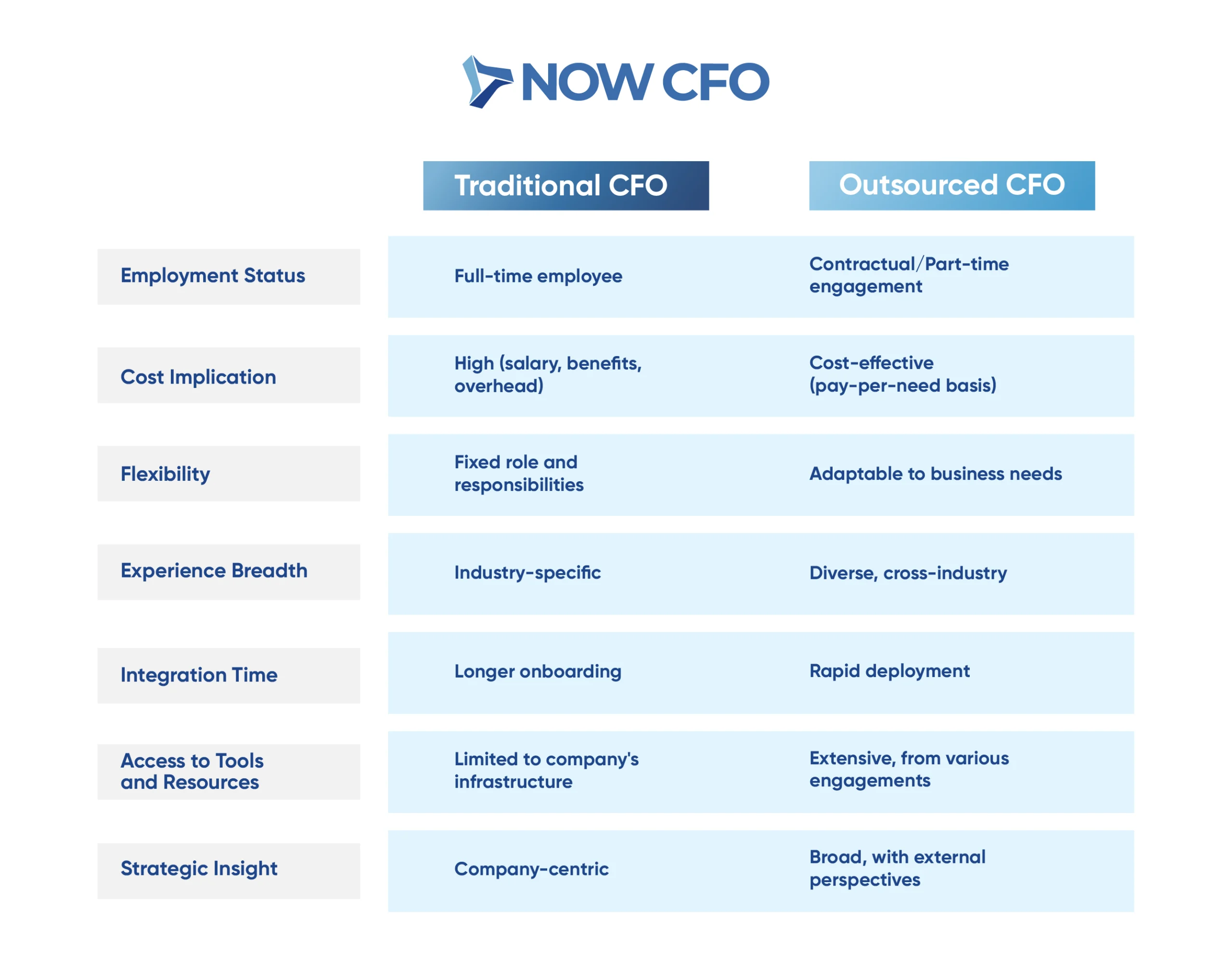
This comparison underscores the adaptability and cost-effectiveness of outsourced CFOs, making them a strategic choice for businesses seeking agile financial leadership.
How Outsourced CFOs Fit into Existing Teams
Integrating an outsourced CFO into an existing team requires clear communication and defined roles. These professionals often collaborate closely with internal finance teams, including controllers and bookkeepers, to ensure alignment in financial reporting and strategy.
Key integration strategies include:
- Regular Communication: Establishing consistent meetings to align on financial goals and updates.
- Defined Roles: Delineating responsibilities to avoid overlap and ensure efficiency.
- Cultural Assimilation: Understanding and adapting to the company’s culture to foster collaboration.
By embedding themselves into the organizational fabric, outsourced CFOs can drive impactful financial strategies while complementing existing team dynamics.
Typical Duration and Scope of Engagement
The engagement duration of an outsourced CFO varies based on the company’s needs. Engagements can typically range from a few months to several years. For instance, virtual CFO tasks often span six to eight months, focusing on specific projects or transitions.
In contrast, fractional CFO engagements might extend to several years, offering ongoing strategic support. The scope of work can encompass:
- Strategic Planning: Developing long-term financial strategies aligned with business objectives.
- Financial Reporting: Ensuring accurate and timely financial statements for stakeholders.
- Risk Management: Identifying potential financial risks and implementing mitigation strategies.
This flexibility allows businesses to tailor the engagement to their requirements, ensuring optimal value from the outsourced CFO’s expertise.
Core Responsibilities of an Outsourced CFO
An outsourced CFO is pivotal in steering a company’s financial strategy, ensuring robust financial health, and facilitating informed decision-making. Their responsibilities encompass a broad spectrum of financial functions, each critical to the organization’s success.
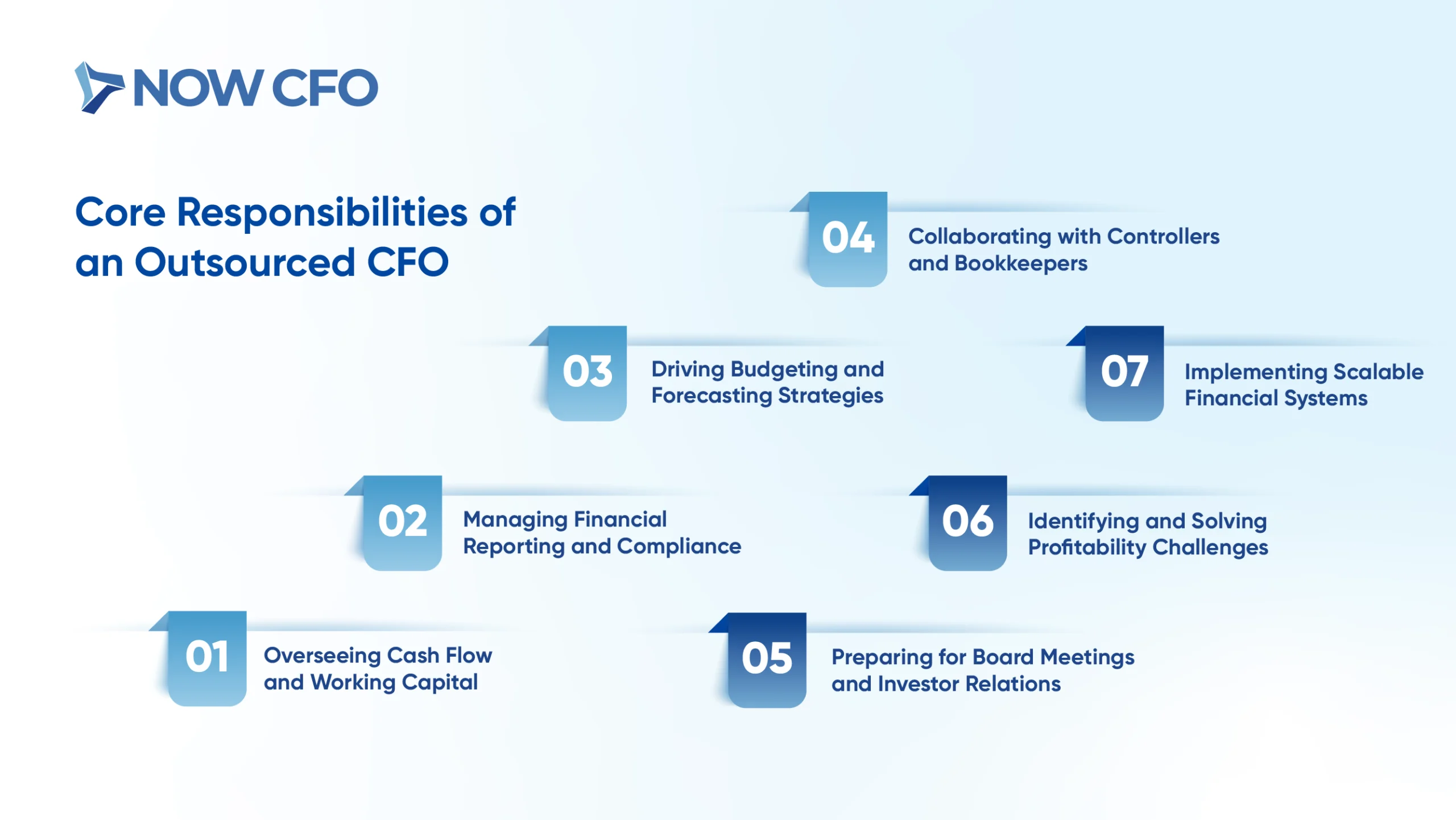
Let’s delve into these core responsibilities:
Overseeing Cash Flow and Working Capital
Effective cash flow management is the lifeblood of any business. An outsourced CFO monitors the inflow and outflow of cash, ensuring that the company maintains sufficient liquidity to meet its obligations and invest in growth opportunities
Key strategies include:
- Cash Flow Forecasting: Predicting future cash needs to prevent shortages.
- Working Capital Optimization: Managing receivables, payables, and inventory to free up cash.
- Expense Management: Identifying and reducing unnecessary expenditures.
These practices enhance liquidity and contribute to the company’s overall financial stability.
Managing Financial Reporting and Compliance
Accurate financial reporting and adherence to compliance standards are non-negotiable for businesses. An outsourced CFO ensures that financial statements are prepared following applicable accounting standards and regulatory requirements.
Responsibilities encompass:
- Financial Statement Preparation: Generating balance sheets, income, and cash flow statements.
- Regulatory Compliance: Ensuring adherence to tax laws, financial regulations, and industry standards.
- Audit Readiness: Preparing for internal and external audits by maintaining accurate records and documentation.
- Internal Controls Implementation: Establishing procedures to prevent fraud and errors.
By maintaining compliance and transparent reporting, businesses build trust with stakeholders and avoid legal pitfalls.
Driving Budgeting and Forecasting Strategies
Strategic budgeting and forecasting are essential for setting financial goals and anticipating future challenges. An outsourced CFO collaborates with management to develop realistic budgets aligned with the company’s objectives.
Key activities include:
- Budget Development: Creating detailed financial plans that allocate resources effectively.
- Scenario Analysis: Assessing the impact of different business conditions on financial performance.
These processes enable proactive decision-making and help the company stay on course toward its financial targets.
Collaborating with Controllers and Bookkeepers
An outsourced CFO works closely with controllers and bookkeepers to ensure accurate financial record-keeping and reporting. They provide guidance on complex accounting issues and help streamline financial processes.
For instance, the CFO oversees the implementation of new accounting software, ensuring that controllers and bookkeepers are adequately trained. They also review financial reports prepared by the accounting team, providing insights and recommendations for improvement.
Preparing for Board Meetings and Investor Relations
Effective communication with the Board and investors is crucial for securing support and funding. An outsourced CFO prepares comprehensive financial reports and presentations that provide insights into the company’s performance and strategic direction. They address questions and concerns, fostering transparency and confidence among stakeholders.
Additionally, CFO participates in investor meetings, articulating the company’s financial strategy and growth prospects. Their expertise helps build strong relationships with investors and secure the necessary capital for expansion.
Identifying and Solving Profitability Challenges
Maintaining and improving profitability is a continuous challenge for businesses. An outsourced CFO analyzes financial data to identify areas where the company can increase revenue or reduce costs. They develop and implement strategies to enhance profit margins.
Key approaches include:
- Cost-Benefit Analysis: Evaluating the financial impact of business decisions.
- Pricing Strategy Optimization: Adjusting pricing models to maximize revenue.
- Operational Efficiency Improvements: Streamlining processes to reduce waste and lower expenses.
By addressing profitability challenges head-on, the CFO contributes to the company’s financial health and long-term success.
Implementing Scalable Financial Systems
As businesses grow, their financial systems must evolve to handle increased complexity. An outsourced CFO assesses the current financial infrastructure and recommends scalable solutions that support expansion. They oversee the implementation of new systems, ensuring they align with the company’s needs and the industry’s best practices.
They are involved in integrating advanced accounting software, establishing standardized procedures, and training staff on new processes. A robust financial system enhances data accuracy, facilitates compliance, and provides valuable insights for decision-making.
Specialized Services Offered by Outsourced CFOs
Outsourced CFO services for small businesses extend beyond traditional financial management. These services provide strategic support tailored to complex business scenarios, which are crucial for companies navigating significant financial events or transformations.
Supporting Mergers and Acquisitions
In M&A, an outsourced CFO ensures seamless financial integration and strategic alignment. They conduct thorough due diligence, assessing the financial health of potential targets to identify risks and opportunities. This process includes evaluating financial statements, cash flow projections, and capital structure to determine the viability of the deal.
Post-acquisition, the outsourced CFO oversees the integration of financial systems and processes, ensuring consistency and compliance across the newly formed entity. Their expertise in financial systems facilitates a smooth transition, minimizing disruptions to operations.
Additionally, they develop strategies to optimize profitability improvement, aligning financial goals with the company’s long-term vision.
Guiding Capital Raise and Investor Due Diligence
Securing capital is a critical milestone for growing businesses. An outsourced CFO provides invaluable support in this endeavor through two key functions:
- Investor Due Diligence Preparation: They prepare comprehensive financial documentation, including financial KPIs, forecasts, and risk assessments, to present a transparent and compelling case to potential investors. This meticulous preparation enhances investor confidence and facilitates smoother negotiations.
- Strategic Financial Leadership: Leveraging their experience, they advise on optimal funding structures, balancing debt and equity to maintain a healthy capital structure. Their insights guide businesses in making informed decisions that align with their growth objectives.
Learn More: Financial due diligence checklist
Leading Financial Modeling and Long-Term Planning
An outsourced CFO is instrumental in developing robust financial models that serve as blueprints for a company’s future. Their contributions include:
- Comprehensive Financial Modeling: They construct dynamic models that simulate various business scenarios, incorporating variables such as market trends, operational costs, and revenue streams. These models aid in strategic decision-making and risk assessment.
- Long-Term Strategic Planning: Beyond immediate financial concerns, they assist in crafting long-term plans that encompass forecasting and budgeting, investment strategies, and debt restructuring. This foresight ensures sustainable growth and financial stability.
Driving Turnaround and Restructuring Initiatives
When businesses face financial distress, an outsourced CFO catalyzes recovery. They conduct in-depth analyses to identify issues affecting profitability improvement and operational efficiency. They steer the company towards financial health by implementing cost-control measures, renegotiating debt terms, and streamlining processes.
Outsourced CFO responsibilities extends to stakeholder communication, where they present turnaround strategies to investors and creditors, fostering trust and securing necessary support. Their objective perspective and expertise in strategic decision-making are vital in navigating complex restructuring processes.
Advising on ERP Implementation and Integration
Implementing an ERP system is a significant undertaking that requires meticulous planning and execution. An outsourced CFO provides strategic oversight during this process, ensuring that the selected ERP solution aligns with the company’s financial and operational needs.
Their involvement mitigates risks associated with ERP implementation, such as cost overruns and operational disruptions, by establishing clear timelines, budgets, and performance metrics. This structured approach ensures a successful transition to the new system.
Conducting Risk Assessments and Internal Controls Reviews
Proactive risk management is essential for business continuity. An outsourced CFO conducts comprehensive risk assessments to identify potential financial, operational, and compliance risks. They evaluate existing internal controls, ensuring they are robust and effective in mitigating identified risks.
Their recommendations often include:
- Enhancing Internal Controls: Implementing or updating policies and procedures to strengthen oversight and accountability.
- Compliance Audits: Ensuring adherence to regulatory requirements and industry standards, safeguarding the company against legal and financial penalties.
Coaching Internal Finance Leaders
Developing internal financial leadership is a strategic investment for any organization. An outsourced CFO mentors finance team members, enhancing their skills in financial KPIs analysis, budgeting, and compliance.
Through knowledge transfer and capacity building, they empower internal leaders to take on greater responsibilities, ensuring the sustainability of financial management practices. This coaching fosters a culture of continuous improvement and positions the finance team to contribute more effectively to the company’s strategic goals.
Benefits of Hiring an Outsourced CFO
An outsourced CFO offers a range of benefits that can significantly enhance a company’s financial health and strategic direction. These advantages are particularly valuable for businesses seeking cost-effective solutions without compromising expertise.
Cost-Effective Access to Executive Financial Leadership
Engaging an outsourced CFO provides businesses with high-level financial expertise at a fraction of the cost of hiring a full-time executive. This approach eliminates expenses associated with salaries, benefits, and overhead, allowing companies to allocate resources more efficiently.
For instance, while a full-time CFO’s annual salary can exceed $400,000, outsourced CFO services typically range from $5,000 to $12,000 per month, depending on the scope of work. This substantial cost difference enables businesses to invest in other critical areas.
Flexible and Scalable Engagement
One key advantage of hiring an outsourced CFO is the flexibility and scalability of their services. This adaptability ensures businesses can adjust financial leadership support based on their evolving needs.
- Customized Service Levels: Engagements can be tailored to specific projects or timeframes, providing support precisely when needed.
- Growth Alignment: As a company expands, the scope of CFO services can scale accordingly, ensuring continuous alignment with business objectives.
- Resource Optimization: During periods of stability, services can be scaled back, optimizing costs without sacrificing strategic oversight.
Industry-Specific Expertise Without Long-Term Contracts
An outsourced CFO brings specialized knowledge across various industries, offering insights that might not be available internally. This expertise allows for implementing best practices and innovative financial strategies tailored to specific market dynamics.
Key benefits include:
- Diverse Experience: Exposure to multiple industries equips outsourced CFOs with a broad perspective on financial management.
- Regulatory Acumen: Familiarity with industry-specific regulations ensures compliance and mitigates risk.
- Strategic Innovation: Ability to apply cross-industry insights fosters innovative solutions to financial challenges.
Quick Implementation and Faster Results
Outsourced CFOs are adept at swiftly integrating into existing business structures, enabling rapid identification of financial inefficiencies and the implementation of effective solutions. Their experience across various industries allows them to quickly assess situations and apply proven strategies to enhance financial performance.
This prompt action leads to faster realization of financial improvements, such as optimized cash flow, improved budgeting processes, and enhanced financial reporting accuracy. Delivering quick results is crucial for businesses aiming to adapt rapidly to market changes or internal growth.
Better Financial Visibility and Decision-Making
An outsourced CFO enhances a company’s financial visibility by providing accurate, timely, and insightful financial reporting. This clarity enables informed decision-making, allowing leadership to strategize effectively and respond proactively to financial trends.
By implementing robust financial systems and key performance indicators (KPIs), outsourced CFOs facilitate a deeper understanding of financial health and operational efficiency. This comprehensive financial oversight supports strategic planning and drives sustainable business growth.
How an Outsourced CFO Differs from an In-House CFO
Understanding the distinctions between an outsourced CFO and an in-house CFO is crucial for businesses evaluating their financial leadership options. While both roles aim to steer the company towards financial health, their approaches, commitments, and costs differ significantly.
Compensation and Cost Comparison
A primary consideration when choosing between an outsourced CFO and an in-house CFO is the cost of each. The financial commitment varies regarding salary and benefits, bonuses, and other overheads.
| Aspect | Outsourced CFO | In-House CFO |
|---|---|---|
| Annual Base Salary | $150,000 – $200,000 | Approximately $400,000 |
| Benefits & Bonuses | Typically not included | Often includes bonuses, stock options, and comprehensive benefits |
| Flexibility | High, services can be scaled as needed | Low – fixed salary regardless of workload |
| Long-Term Commitment | Short-term or project-based contracts | Long-term employment contracts |
| Overhead Costs | Minimal | High, includes office space, equipment, and administrative support |
Breadth of Experience from Working with Multiple Clients
An outsourced CFO often brings diverse experiences from working with various clients across different industries. This exposure equips them with a broad perspective on financial strategies, risk management, and industry-specific challenges.
On-Demand Strategic Insights Without Overhead
Engaging an outsourced CFO allows businesses to access high-level financial expertise without the overhead associated with a full-time executive. This arrangement provides on-demand strategic insights, enabling companies to make informed decisions swiftly. The flexibility of this model ensures that businesses can scale services up or down based on current needs, optimizing resource allocation.
Level of Involvement and Hours Committed
The commitment level of an outsourced CFO can be tailored to a company’s specific requirements. This flexibility ensures that businesses receive the necessary support without incurring unnecessary costs.
- Part-Time Engagement: Ideal for startups or small businesses needing strategic guidance without a full-time commitment.
- Project-Based Involvement: Suitable for companies undergoing significant changes like mergers, acquisitions, or system implementations.
- Interim Leadership: Provides temporary executive support during transitions or while searching for a permanent CFO.
Access to Firm-Wide Financial Tools and Resources
An outsourced CFO typically has access to a suite of advanced financial tools and resources through their firm. This access enhances their ability to deliver comprehensive financial analysis and strategic planning.
- Advanced Analytics Platforms: Utilize sophisticated software for in-depth financial modeling and forecasting.
- Benchmarking Data: Access to industry benchmarks aids in evaluating company performance relative to peers.
- Regulatory Compliance Tools: Ensure financial regulations and standards are adhered to, mitigating risk.
When Should a Business Hire an Outsourced CFO?
An outsourced CFO becomes indispensable when a business encounters specific financial challenges or transitions. Recognizing these pivotal moments ensures timely intervention, optimizing financial health and strategic direction.
Rapid Growth or Expansion
Experiencing rapid growth or expansion presents both opportunities and challenges. While increased revenue is advantageous, it often brings complexities in financial management. An outsourced CFO provides the expertise to navigate these complexities, ensuring sustainable growth.
For instance, during expansion, businesses may face:
- Cash Flow Management: Ensuring that increased operational costs don’t outpace revenue.
- Resource Allocation: Strategically investing in areas that yield the highest returns.
- Financial Forecasting: Predicting future financial trends to make informed decisions.
Preparing for Funding or Investment
Securing funding or attracting investors requires meticulous financial preparation. An outsourced CFO plays a crucial role in this process by:
- Developing Comprehensive Financial Models: Presenting potential investors with clear projections and ROI estimates.
- Ensuring Financial Transparency: Providing accurate and detailed financial statements that instill confidence.
- Strategic Planning: Aligning financial strategies with investor expectations and market conditions.
Financial Reporting Inefficiencies
Inaccurate or delayed financial reporting can hinder decision-making and erode stakeholder trust. An outsourced CFO addresses these inefficiencies by:
- Implementing Robust Reporting Systems: Ensuring timely and accurate financial data.
- Standardizing Financial Processes: Creating consistent reporting methodologies across departments.
- Training Staff: Educating internal teams on best practices in financial reporting.
Audit or Compliance Challenges
Navigating audits and ensuring compliance with financial regulations is critical. An outsourced CFO assists by:
- Conducting Internal Audits: Identifying and rectifying potential compliance issues proactively.
- Staying Updated on Regulations: Ensuring the business adheres to the latest financial laws and standards.
- Liaising with External Auditors: Facilitating smooth communication and information exchange during audits.
Lack of Financial Direction or Forecasting Capability
Without clear financial direction or forecasting, businesses may struggle to allocate resources effectively or anticipate future challenges. An outsourced CFO provides:
- Strategic Financial Planning: Setting long-term financial goals aligned with business objectives.
- Budget Development: Creating detailed budgets that guide spending and investment decisions.
- Forecasting Models: Predicting future financial scenarios to prepare for various market conditions.
Conclusion
Whether your business is scaling fast, preparing for investment, or struggling with financial clarity, the strategic support of an outsourced CFO can make all the difference. An outsourced CFO helps you sharpen decision-making, optimize cash flow, and accelerate growth by providing flexible, on-demand leadership.
Now is the time to elevate your financial strategy. Instead of managing spreadsheets and reacting to numbers, start steering your business with confidence and intention with NOW CFO. Schedule a free consultation with our financial experts. See how an outsourced CFO can help you unlock scalable efficiency and strategic growth for your organization.




